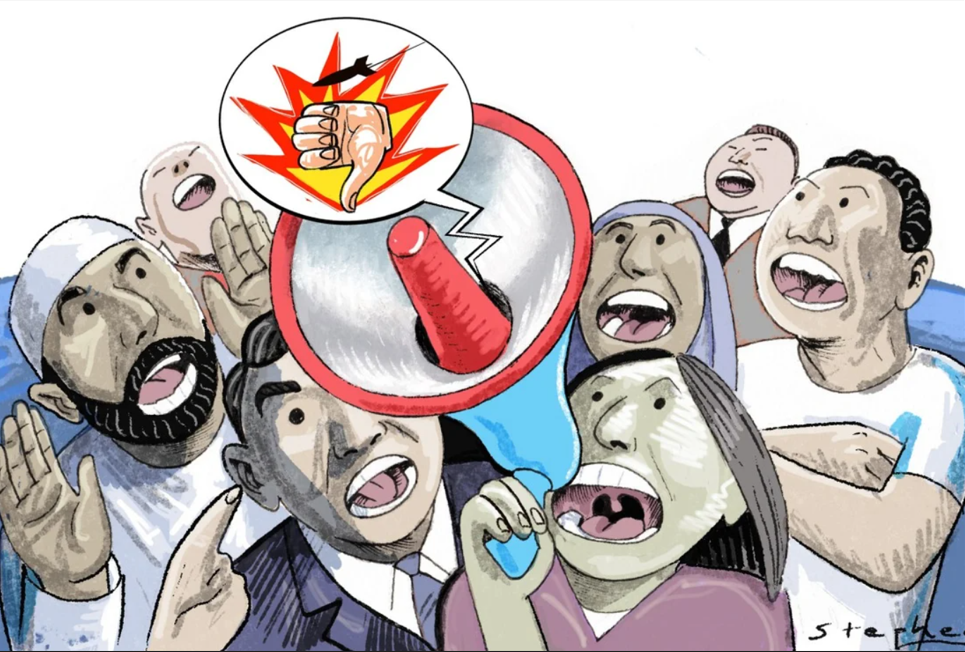John Gong is a professor at the University of International Business and Economics (UIBE) and vice-president for research and strategy at the UIBE-Israel. He is also a China Forum expert.
When US President George W. Bush launched the second Gulf War, he coined the phrase the “coalition of the willing” to refer to the countries who supported the 2003 invasion of Iraq and subsequent military occupation, on the grounds of Saddam Hussein’s connection to al-Qaeda and Iraq’s development of weapons of mass destruction, both of which proved to be fabrications.

Nevertheless, over 400,000 people paid with their lives. Today, I advocate the creation of a “coalition of the unwilling” – an alliance to stay out of the war.
Like many countries, China takes a neutral position, one of principled neutrality that promotes a peaceful solution in Ukraine and humanitarian assistance to the country, while also striving to maintain normal trade relations with both Ukraine and Russia.
This neutral position is justified not only by selfish national interests but also morally. Sanctions kill just as T-72 tanks do. A article published in Foreign Affairs in 1999 called sanctions “weapons of mass destruction” as they cause economic hardship, denial of access to medical supplies and possibly starvation.
But even if we disregard the potential sanction casualties in Russia, today’s sanctions, led by the collective West, will probably kill more people outside Russia, given it is a major global exporter of agricultural and energy products. Therefore, the neutrality position, in addition to avoiding siding with a warring party, is on the side of peace and humanity.
The number of countries that have not imposed sanctions grossly outweighs the number that have. The size of the population these countries represent outweighs even more. Almost the entire Global South is not in the sanctions camp. They are the real majority, the silent majority.
This Valdai Discussion Club’s conference is about the Middle East. And not a single country in the Middle East is in the sanctions camp. These are countries that range from full democracies to authoritarian regimes, from countries of strong religious faith to secular states, from America’s closest ally to America’s bitter arch-enemy, and from Nato member state to major non-Nato allies of the US. In short, they encompass a wide range of the political spectrum.
Yet Washington frames this war as a battle between democracy and authoritarianism.
In the 19th century, it was pretty easy for the British Empire to adopt a neutral policy with respect to the constant conflicts on the European continent, a policy historians credit as the “splendid isolation”. But it is not so easy today to be a neutral state.
China is at the forefront of Washington’s grudge against the neutrality camp, understandably, due to its status as a global trading nation and in particular, its thriving trading relations with Russia.
China is singled out even though it buys less oil from Russia than India, and restricts trade with Russia strictly to the civilian space. Washington is promoting a false narrative around the world that somehow, China’s continued normal trading relationship with Russia is tantamount to siding with Russia in this war.
US Secretary of State Antony Blinken, during his recent visit to Kazakhstan, warned that “China can’t have it both ways”. Washington has been spewing speculative stories about Chinese companies providing civilian products to Russia for potentially military applications.
During an interview with ABC News, US President Joe Biden said, “Putin is applauding it,” – referring to China’s peace plan – “so how could it be any good?” He did not mention that Zelensky is also applauding it. Washington is actively promoting an interpretation of normal trade statistics between China and Russia as China being on the brink of providing so-called material support to Russia.
That two-way trade can be interpreted as one-way support is baffling. If China’s roughly US$200 billion trade with Russia in 2022 is “material support”, then China’s roughly US$700 billion trade with the US must be “heavenly support”! That narrative is total chicanery.
But Washington is not going to just stop with China. As long as Kyiv is still losing ground in the battlefield, as long as the stalemate in the battlefield lasts, as long as the war risks further escalation and expansion, the pressure on the neutrality camp will keep mounting. Today it is China. Tomorrow it could be India. And the day after that it could be Israel, the Arab states, etc.
In an interview last December, Nato Secretary General Jens Stoltenberg warned that the conflict could escalate into a “a full-fledged war that spreads into a major war between Nato and Russia.” If that happens, expect it to lean harder on its allies to fall in line. US allies in the Middle East will come under increasing pressure from the US, the European Union and Nato to cut or reduce ties with Russia, enforce sanctions and step up aid to Ukraine, including possibly military assistance.
It is time for the silent majority of the world to resist increasing political pressure from the West, and establish a “coalition of the unwilling” to stay out of the war. A coalition of the unwilling is in the interests of peace and the coalition states’ national interests.
The silent majority needs to speak up with a unified message: “No, we don’t want to have any business with this war, and we jointly support the peace effort to mediate for an acceptable solution.” Today, it is no longer enough to just passively, unilaterally stay out of this war. The world’s neutrality camp needs to proactively, jointly and multilaterally stay out of the war.
(This article is an edited version of a speech delivered at the Valdai Discussion Club – the 12th Middle East Conference in Moscow, Russia – on March 1, and was first published on South China Morning Post on Mar. 8, 2023.)
